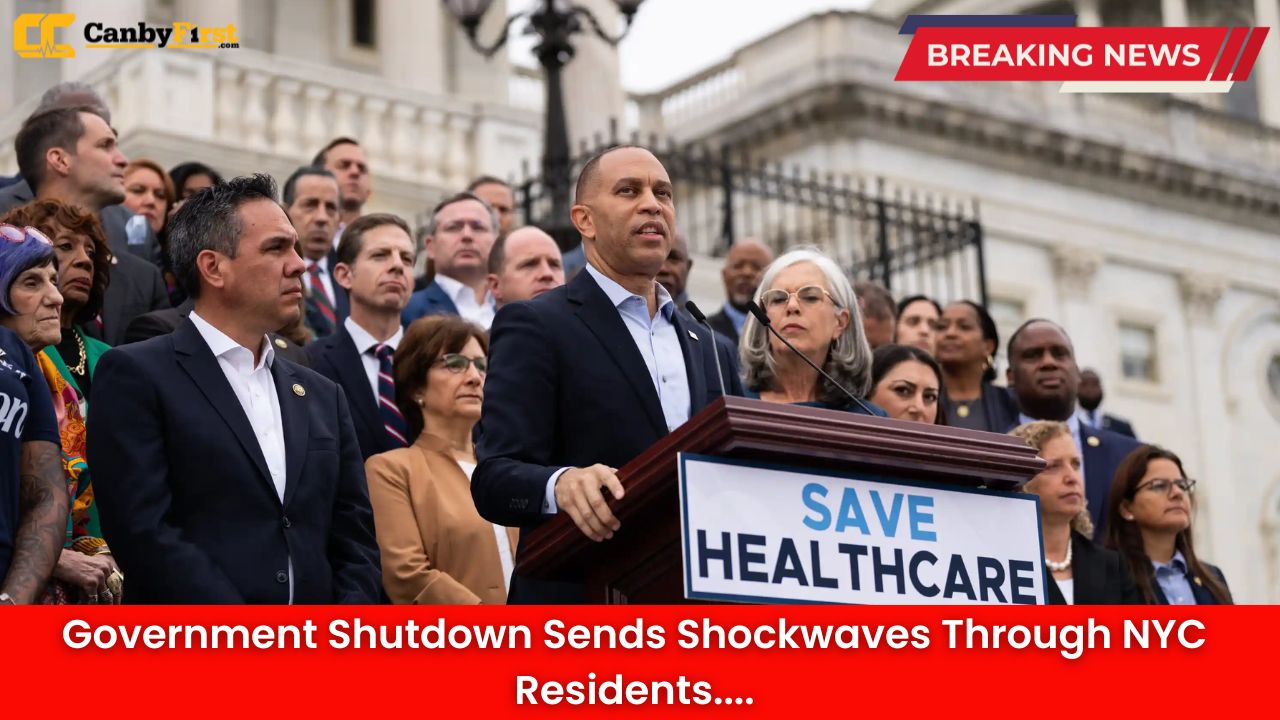New York, US:
The ongoing government shutdown has begun to ripple through New York City, striking uncertainty into the lives of countless residents who rely on federal programs, contracts, and public services. With no resolution in sight, the city that never sleeps is feeling the weight of Washington’s gridlock across multiple sectors — from housing and public health to transportation and small businesses.
Federal Workers Face Immediate Strain
Tens of thousands of federal employees based in New York City, including workers at agencies such as the Department of Homeland Security, the Environmental Protection Agency, and the Internal Revenue Service, have found themselves furloughed or working without pay. Many are now forced to make difficult financial decisions to cover basic necessities like rent and groceries.
Also Read
Local charities and food banks have reported an uptick in demand, with furloughed workers and contractors seeking temporary relief. One Brooklyn-based support organization noted that families who once donated to food drives are now standing in line for assistance.
Impact on Housing and Public Assistance
The shutdown’s effects extend to federally funded housing programs across the city. The Department of Housing and Urban Development (HUD) has been unable to process renewals for affordable housing contracts, putting thousands of tenants and landlords in limbo.
Officials warn that if the shutdown continues, Section 8 housing vouchers could face delays, impacting vulnerable families in neighborhoods from Harlem to the Bronx. Public housing residents, already struggling under years of disrepair and bureaucratic delays, could see maintenance requests slow even further as federal funds tighten.
Meanwhile, Supplemental Nutrition Assistance Program (SNAP) benefits are being stretched thin. Though emergency allocations have temporarily kept the program running, experts warn that millions of low-income New Yorkers could face reduced food benefits if the federal standoff persists into the next month.
Transportation System Under Pressure
One lesser-known consequence of the federal shutdown is the effect on New York’s immense transportation network. Air traffic controllers and Transportation Security Administration (TSA) officers — both essential federal employees — continue to work without pay, raising concerns about staffing shortages at major airports like JFK, LaGuardia, and Newark Liberty International.
Passengers have already faced longer security lines and minor flight delays, particularly during early morning rush hours. Should morale continue to erode among unpaid workers, transportation advocates fear more severe disruptions could follow.
The Metropolitan Transportation Authority (MTA) faces indirect challenges too. Federal infrastructure grants, crucial for modernization projects like new subway signals and station upgrades, are currently on hold. City planners warn that every week of delay could set back long-term transit improvements by months.
Healthcare and Social Services at Risk
New York’s vast healthcare system is also feeling the pinch. Many federally supported research institutions, including those linked to the National Institutes of Health (NIH), have paused new grants and trials. Researchers at major universities and hospitals say vital medical studies are now frozen in bureaucratic limbo.
Community health centers that depend on federal funding are operating on backup reserves. Clinics in Queens and the Bronx, which serve uninsured and low-income patients, are re-evaluating service hours and postponing certain outreach programs. If the shutdown persists, thousands of New Yorkers could lose access to affordable primary care and prescription assistance.
Small Businesses and Contractors Hit Hard
Federal contracts form a quiet but crucial part of New York’s small business economy. Contractors providing everything from IT services to building maintenance for government offices are feeling the effects of halted payments. Some small firms have already had to furlough employees temporarily to stay afloat.
Business owners also report a decline in local consumer spending due to financial uncertainty. Areas surrounding federal buildings in Lower Manhattan and Brooklyn have seen reduced foot traffic, impacting cafes, dry cleaners, and small retailers dependent on federal workers for daily business.
Broader Economic Uncertainty
Economists caution that if the shutdown continues for several more weeks, New York City’s overall economic output could begin to slow. The city’s tourism, retail, and service industries all rely on strong public confidence and steady government support, particularly in a period of general economic volatility.
Financial experts warn of cascading effects — from delayed tax refunds to reduced procurement activity — which could alter New York’s fiscal outlook for the next year. Local officials have urged swift federal action, arguing that extended shutdowns disproportionately affect urban centers like New York, where the cost of living is already among the highest in the nation.
City Officials Step In
Mayor’s Office representatives have assured residents that New York City is taking proactive steps to mitigate the damage. Emergency funds are being deployed to support food banks and housing programs that depend on federal contributions. Additionally, partnerships with private and nonprofit organizations are being strengthened to sustain essential social services.
City Council members are also calling for increased state-level coordination to fill the gaps, ensuring that residents most at risk — such as the elderly, veterans, and families on government assistance — do not fall through the cracks.
Growing Frustration and Uncertainty
On the streets, frustration is mounting as residents express fatigue over repeated federal shutdowns. For many, this latest standoff feels like a déjà vu moment that underscores the fragility of everyday security when political negotiations break down in Washington.
Teachers, transportation workers, and civil service employees alike are calling for long-term reform to prevent the recurring cycle of shutdowns. Conversations across city cafes and subway rides often return to one question: how can a nation as prosperous as the United States repeatedly find itself unable to keep its own government fully open?
The Human Toll
Amid the numbers and political debate, human stories stand out most sharply. A young federal contractor in Queens says she’s missed two paychecks and has begun driving a rideshare at night to cover rent. An elderly Harlem resident worries about the stability of her housing voucher. A single mother in Staten Island fears her SNAP benefits may not last the month.
For millions across New York City, the government shutdown is not an abstract policy issue — it is a daily hardship reshaping how they live, work, and plan for the future.
As negotiations continue in Washington, New Yorkers wait anxiously for an end to the deadlock that has turned America’s most resilient city into a symbol of the far-reaching cost of political paralysis.












